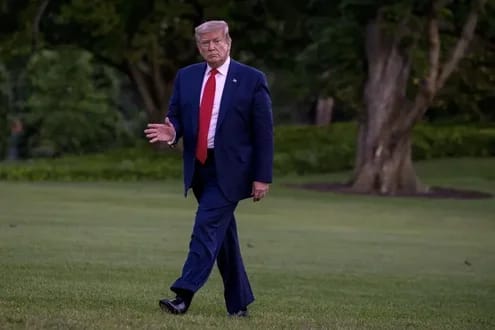Will Recent Crises Oust Donald Trump from the White House?
The killing of George Floyd ignited the largest and most violent protests in modern American history, plunging the United States into one of its most severe crises. But this was not the only crisis defining Donald Trump’s presidency. The COVID-19 pandemic, which hit the U.S. harder than any other country in terms of infections and deaths, compounded the turmoil. The economic fallout of the pandemic disproportionately affected minority communities, leaving millions unemployed and without financial security.
Rather than easing tensions, Trump’s actions fueled the fire—just five months before the 2020 presidential election. His handling of the pandemic was widely criticized, particularly the delayed government aid, which was held up because Trump insisted on having his name printed on relief checks. Then came the George Floyd protests, where he labeled demonstrators as “thugs” and “terrorists,” and even threatened to deploy the military against them. His calls for “dominating” the streets, combined with his controversial use of force against peaceful protesters outside the White House for a photo-op at St. John’s Church, drew widespread condemnation—even from military and religious leaders.
Ninety former senior defense officials, including four former Secretaries of Defense, issued a statement condemning Trump’s attempts to politicize the military for electoral gain. Videos of police brutality flooded social media, further intensifying public outrage. Trump’s confrontational approach led even his own Defense Secretary, Mark Esper, to publicly disagree with him, affirming protesters’ right to free expression.
With so many missteps and controversies, the key question emerges: Will these crises cost Trump his re-election, or will he defy the odds and secure a second term?
The Case Against Trump: A President Exposed
One camp argues that Trump’s failures have been laid bare for all to see and that his chances of winning re-election have been severely damaged. His handling of these crises, they argue, has exposed his incompetence and authoritarian tendencies. A Reuters poll found that 55% of Americans disapproved of Trump’s response to the protests, while 64% expressed sympathy for the demonstrators.
This camp also points to growing dissatisfaction within Trump’s own Republican Party. Prominent figures like Colin Powell, the former Chairman of the Joint Chiefs of Staff and Secretary of State, openly criticized Trump, warning that he is “drifting away” from the U.S. Constitution and posing a serious threat to American democracy.
The Black community and other minority groups, who played a decisive role in electing Barack Obama in 2008, could be a crucial force against Trump. In 2016, their turnout was lower due to doubts about Hillary Clinton. But in 2020, the racial justice protests and the disproportionate impact of COVID-19 on minorities could galvanize them to vote in record numbers, potentially tipping the election against Trump.
The Obama comparison is also significant. The former president was elected after the 2008 financial crisis, which devastated the middle and lower classes—groups heavily represented by minorities. Many believe a similar dynamic could play out in 2020, with Trump’s economic failures pushing these same voters to back Joe Biden.
The Case for Trump: Strength in Crisis
On the other hand, Trump’s supporters argue that the very crises meant to bring him down may actually help him secure re-election. They see the relentless efforts to remove him—whether through impeachment, protests, or legal battles—as evidence that Democrats know they cannot defeat him through conventional means.
This camp believes that many Americans will rally behind a “strong leader” in times of crisis. The violent scenes of looting, property destruction, and chaos during the protests play into Trump’s “law and order” narrative. Many business owners and middle-class voters who suffered losses due to the riots may see Trump as their only option to restore order.
Moreover, Trump’s core supporters—predominantly white nationalists, hardline conservatives, and right-wing populists—remain fiercely loyal. This base, which propelled him to victory in 2016, sees itself as fighting against what they perceive as a “changing” America, where minorities and immigrants threaten the traditional social order. They will vote for Trump again, believing he is their last line of defense.
Another key argument is historical precedent: Americans rarely change presidents during major crises. Even amid economic turmoil or war, incumbent presidents often secure re-election. Furthermore, many view Biden as a weak candidate lacking the charisma or energy to mobilize voters. Some even go as far as to describe the Democratic Party as “politically comatose,” unable to mount a serious challenge against a figure as polarizing as Trump.
The Polls: A Warning for Trump?
Trump has also alienated key institutions, including the military and the media. His ongoing conflicts with the Pentagon and the press have contributed to declining approval ratings. Recent polls indicate a significant lead for Biden:
• A Washington Post-ABC News poll showed Biden leading Trump by 10 points (54% to 44%) nationwide.
• In key swing states that helped Trump win in 2016, Biden is now ahead:
• Florida: Biden 48% – Trump 46%
• Wisconsin: Biden 49% – Trump 40%
Losing these battleground states would make it nearly impossible for Trump to secure re-election.
A Nation Divided: An Unprecedented Election
Despite Trump’s declining poll numbers, his defeat is far from certain. The U.S. is experiencing one of the most intense periods of political polarization in its history. The November election will be defined by record voter turnout, deep ideological divisions, and perhaps even legal battles over mail-in ballots and election security.
While Trump’s presidency has been marked by controversy, his ability to rally his base and exploit America’s divisions remains a powerful advantage. Whether he wins or loses, one thing is clear: the 2020 election will be one of the most consequential in U.S. history.
